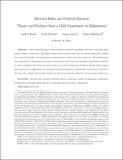| dc.contributor.author | Beath, Andrew | |
| dc.contributor.author | Christia, Fotini | |
| dc.contributor.author | Egorov, Georgy | |
| dc.contributor.author | Enikolopov, Ruben | |
| dc.date.accessioned | 2018-11-02T20:48:16Z | |
| dc.date.available | 2018-11-02T20:48:16Z | |
| dc.date.issued | 2016-07 | |
| dc.identifier.issn | 0034-6527 | |
| dc.identifier.issn | 1467-937X | |
| dc.identifier.uri | http://hdl.handle.net/1721.1/118863 | |
| dc.description.abstract | Voters commonly face a choice between competent candidates and those with policy preferences similar to their own. This article explores how electoral rules, such as district magnitude, mediate this trade-off and affect the composition of representative bodies and the quality of policy outcomes. We show formally that anticipation of bargaining over policy causes voters in elections with multiple single-member districts to prefer candidates with polarized policy positions over more competent candidates. Results from a unique field experiment in Afghanistan are consistent with these predictions. Specifically, representatives selected by elections with a single multi-member district are better educated and exhibit less extreme policy preferences. | en_US |
| dc.description.sponsorship | United States. Army Research Office. Multidisciplinary University Research Initiative (Award W911NF-12-1-0509) | en_US |
| dc.description.sponsorship | World Bank | en_US |
| dc.description.sponsorship | Food and Agriculture Organization of the United Nations | en_US |
| dc.publisher | Oxford University Press (OUP) | en_US |
| dc.relation.isversionof | http://dx.doi.org/10.1093/RESTUD/RDW018 | en_US |
| dc.rights | Creative Commons Attribution-Noncommercial-Share Alike | en_US |
| dc.rights.uri | http://creativecommons.org/licenses/by-nc-sa/4.0/ | en_US |
| dc.source | SSRN | en_US |
| dc.title | Electoral Rules and Political Selection: Theory and Evidence from a Field Experiment in Afghanistan | en_US |
| dc.type | Article | en_US |
| dc.identifier.citation | Beath, Andrew, et al. “Electoral Rules and Political Selection: Theory and Evidence from a Field Experiment in Afghanistan.” The Review of Economic Studies, vol. 83, no. 3, July 2016, pp. 932–68. © 2016 The Author | en_US |
| dc.contributor.department | Massachusetts Institute of Technology. Department of Political Science | en_US |
| dc.contributor.mitauthor | Christia, Fotini | |
| dc.relation.journal | The Review of Economic Studies | en_US |
| dc.eprint.version | Original manuscript | en_US |
| dc.type.uri | http://purl.org/eprint/type/JournalArticle | en_US |
| eprint.status | http://purl.org/eprint/status/NonPeerReviewed | en_US |
| dc.date.updated | 2018-10-17T13:08:37Z | |
| dspace.orderedauthors | Beath, Andrew; Christia, Fotini; Egorov, Georgy; Enikolopov, Ruben | en_US |
| dspace.embargo.terms | N | en_US |
| dc.identifier.orcid | https://orcid.org/0000-0003-1076-9879 | |
| mit.license | OPEN_ACCESS_POLICY | en_US |
